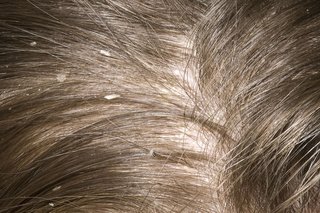Dandruff is a common skin condition. It's not harmful and you cannot catch it.
Check if it's dandruff

DR P. MARAZZI/SCIENCE PHOTO LIBRARY
The flakes are often more noticeable in darker hair and if they fall from your scalp on to your shoulders.
Your scalp may also feel dry and itchy.
How to treat dandruff yourself
Use an anti-dandruff shampoo. There are several different types you can buy from pharmacies or supermarkets.
Look for shampoo containing one of these ingredients:
- zinc pyrithione
- salicylic acid
- selenium sulphide (or selenium sulfide)
- ketoconazole
- coal tar
Your pharmacist can tell you how to use the shampoo.
Use the shampoo for a month to see if your dandruff improves. You might need to try more than one type to find one that works for you.
Non-urgent advice: See a GP if:
- you still have symptoms after using anti-dandruff shampoo for a month
- your dandruff is bad or your scalp is very itchy
- your scalp is red or swollen
The GP can check your scalp for skin conditions that could be causing your dandruff.
Causes of dandruff
Dandruff is not caused by poor hygiene, although it may be more obvious if you do not wash your hair regularly.
Stress and cold weather may also make dandruff worse.
| Symptoms | Possible causes |
|---|---|
| scaly, itchy and red patches on skin on scalp, face and other areas of the body | seborrheic dermatitis |
| red or silver rash on scalp, sometimes with patchy hair loss | tinea capitis, known as ringworm |
| dry, red, flaky and very itchy skin on areas of the body | eczema |
| red, inflamed (irritated) skin; may also have blisters and cracked skin – reaction to products such as hair dye, sprays, gels or mousses | contact dermatitis |
| red, flaky, crusty and sore patches of skin covered with silvery scales | psoriasis |
| greasy, yellowish crusts on baby's scalp, eyebrows and nappy area | cradle cap |
Do not worry if you're not sure what is causing your dandruff. Follow the advice on this page and see a GP if things do not improve in a month.
Page last reviewed: 2 October 2019
Next review due: 2 October 2022
